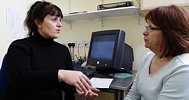Categorizing types of dyslexia into clearly defined sets and subsets is difficult. Dyslexia is a condition that is very much individualized in its severity and symptoms. To further complicate a clean-cut diagnosis, dyslexia can be accompanied by other conditions such as ADHD. Listed below are categories of dyslexia. The reader should remember that having one of these types of dyslexia does not mean other types of issues might not be present as well.
Primary dyslexia is a type of dyslexia that is used to describe a dysfunction of the left side of the brain. People who have this type of dyslexia will struggle with reading, spelling, and writing, in various degrees, through adulthood. Primary dyslexia has been determined to be hereditary. This condition appears to be more prevalent in boys.
Secondary dyslexia, or "developmental dyslexia," is thought to be caused by hormonal development of the fetus during pregnancy. This type of dyslexia is thought to be highly treatable and has a good possibility of lessening and even going away as the child grows. Again, it is more common in boys.
One of the more rare types of dyslexia is trauma dyslexia. This usually occurs after some form of brain injury. This was in fact the original symptom that led to dyslexic research being started back in the 1860s. It is still seen today, but mostly in adults who have suffered severe brain trauma and is rarely present in children.
It is important to realize that these are considered "causes" for the different types of dyslexia. Listed below are the symptoms, or types, brought on by the above causes.
Visual dyslexia is the result of immature development of the vision process. This could be, in part, that the eyes are not completely developed or have a defect. The eyes will send incomplete information to the visual center of the brain. This visual misinformation is then wrongly translated by the brain. This can lead to problems with reading and writing.
Phonological dyslexia—or auditory dyslexia—is the hearing version of visual dyslexia in many ways. However a more serious condition called Processing Disorder may exist. This type of dyslexia makes it hard for the person to understand sounds, particularly words. Sentences may be jumbled and hard to understand.
Dyspraxia relates to difficulty with motor integration. The child will have coordination problems and will often be considered as being "just clumsy." Sufferers might also have problems with coordinated thought, language, and perception. Sometimes a child might outgrow this.
Dysgraphia is one of the types of dyslexia that has a very significant effect on education. This type of dyslexia refers an immaturity in fine motor skills that makes holding a pencil and writing difficult. Often the student's handwriting will be illegible. Over time, with help and training, improvement can be made.
Probably the least known types of dyslexia is dyscalculia—or number dyslexia. People with dyscalculia will have problems performing simple math functions and grasping abstract math concepts. Often, people with dyscalculia will have difficulties with time, measurement, and spatial reasoning. Because it is the least known of all the different types of dyslexia, it often goes unnoticed.
Hopefully this will give you a better understanding of how most types of dyslexia are categorized. Different types of dyslexia will have different effects on the sufferer. While there are innumerable variations of dyslexia in varying degrees, it is a good idea to have a working knowledge of the basics.



